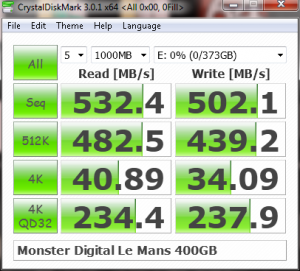CRYSTAL DISK BENCHMARK VER 3.0.1 x64
Crystal Disk Benchmark is used to measure read and write performance through sampling of raw (0/1 Fill/compressible) or random data which is, for the most part, incompressible.
The results are very impressive for a SSD with such high capacity. The results to the left are with easily compressible data, and the result to the right are with the default data test used by Crystal Disk Mark, which is incompressible. With the onboard LSI SandForce using compression for part of its speed advantage, we can see that there are a bit lower results with the incompressible data.
Up until recently, AS SSD was the only benchmark created specifically for SSD testing and it uses incompressible data. Many enthusiasts like to benchmark with AS SSD for their needs. AS SSD, for the most part, gives us the worst case scenario in SSD transfer speeds because of its use of incompressible data and many enthusiasts like to use AS SSD for their needs. Transfer speeds are displayed on the left with IOPS results on the right.

The Le Mans scores very well with 526 MB/s in sequential read and 307 MB/s with sequential write in the AS SSD incompressible benchmark. The latency for reads is superb, at .06, with the writes being a bit higher. The high Queue Depth random results may seem a little low to the untrained eye, but higher capacity SSDs always have a bit lower performance with the high QD random, so these are expected values.
 With the compression benchmark that is included in the AS SSD suite we can see the performance of the Monster Le Mans and how it scales amongst the various levels of compressibility of the data that is presented to it. The write speed is where we see the greatest performance variability during use, with the peak reaching into the 500 MB/s range with 100% compressible data.
With the compression benchmark that is included in the AS SSD suite we can see the performance of the Monster Le Mans and how it scales amongst the various levels of compressibility of the data that is presented to it. The write speed is where we see the greatest performance variability during use, with the peak reaching into the 500 MB/s range with 100% compressible data.
ANVIL STORAGE UTILITIES PROFESSIONAL
Over the last little while, we have been assisting with beta testing new benchmark software called Anvil Storage Utilities which is an absolutely amazing SSD benchmarking utility. Not only does it have a preset SSD benchmark, but also, it has included such things as endurance testing and threaded I/O read, write and mixed tests, all of which are very simple to understand and utilize in our benchmark testing.
 First we look to the fully compressible test. The read latency at QD1 shows as .1, higher than with AS SSD. The write latency at QD1 is reported lower, with .1168ms. The overall score of 3524 is very good for such a large capacity SSD.
First we look to the fully compressible test. The read latency at QD1 shows as .1, higher than with AS SSD. The write latency at QD1 is reported lower, with .1168ms. The overall score of 3524 is very good for such a large capacity SSD. The incompressible data test shows much lower scores, particularly in the write scoring. The write speeds with all SandForce drives tends to be very low overall with incompressible data. With compressible data of various percentages, there will be differing speeds attainable.
The incompressible data test shows much lower scores, particularly in the write scoring. The write speeds with all SandForce drives tends to be very low overall with incompressible data. With compressible data of various percentages, there will be differing speeds attainable.
 The SSD Review The Worlds Dedicated SSD Education and Review Resource |
The SSD Review The Worlds Dedicated SSD Education and Review Resource | 

It’s crazy how the 480 SFs 4k writes totally go tits-up vs the 240 and 120. I’d muuuch rather have 2x240s for almost the same price. That sata3 to usb3 adapter is nice…they’d be crazy not to sell it on the side.
Looks like it comes in at about $680 – $700! I’d much rather have a pair of 240gb V3s for $460 or even 3 240’s for ~$700.
565 seq atto reads is really impressive
scsi = no TRIM with win. 7 need to use 10 series driver
First and foremost, Kingston’s HyperX SSD Upgrade Kits are still the best comprehensive retail box. It includes the tools, adapters, screws, cables, external enclosure (because having an SSD sitting out in plain site isn’t ideal), and Acronis software. In fact, that plate looks just like Patriot Memory’s. That said, just about every SATAIII synchronous and asynchronous SSD offers better 4K write. I would opt to buy any other brand SATAIII for a better price, bundle, and/or desktop experience. Nice try, but the name isn’t enough.